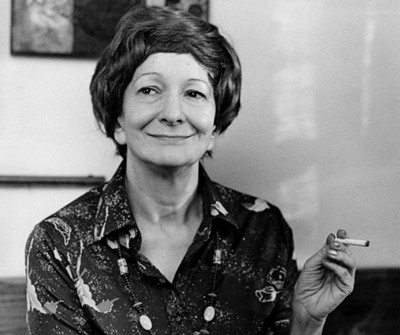(单词翻译:单击)

Scepticism was her watchword. She eschewed political causes; her fight was "against the bad poet who is prone to usingtoo many words". Her favourite phrase was "I don't know". She told the Nobel audience: "It's small, but it flies on mighty wings. It expands our lives to include the spaces within us as well as those outer expanses in which our tiny Earth hangs suspended." Without it, she said, Isaac Newton would have gobbled apples rather than pondering the force that makes them drop. Her compatriot Marie Sklodowska-Curie would have "wound up teaching chemistry at some private high school for young ladies from good families."
辛波丝卡常把怀疑论挂在嘴边。她有意避开政治运动,斗争对象常是那些话多的诗人。她最喜欢的短语是不知道。 诺贝尔奖授奖演说时,她如此说道:这两个词虽然小,却插上了有力的翅膀,扩大了我们内心中的生活范围,还有我们这小小地球悬于其中的天地。如果伊萨克•牛顿没有对自己说我不知道,便不会去想哪种力量使其落下,最多也只不过躬下身去拾起来,津津有味地吃下去;而同胞居里夫人则愿在私立高中教导贵少妇化学而终此一生。
An accretion of answers
答案徒增
It was the same for poets. Each poem was a kind of answer, but as soon as the last full stop hit the page the result seemed inadequate. "So the poets keep on trying, and sooner or later the consecutive results of their self-dissatisfaction are clipped together with a giant paper clip by literary historians and called their 'oeuvre'."
不知道同样适用于诗人。每首诗都含有一种解释,当最后一个句号跃于纸上,答案却显得并不充分。这种不充分使个别诗人不满意自己的创作,于是诗人们不懈地努力着,总有一天,整个诗人群体连续写作的所有诗歌, 所有不充分不满意的加总文学史家于是给他的作品夹上一个大的夹子,美其名曰诗作
Her own output was slender in quantity and lean in style. For all her erudition, she did not come across as intimidatingly brainy (unlike some other Polish post-war poets). Schoolchildren learn her poems by heart, like this one about a bereaved pet.
作品较少的辛波丝卡以文风简洁见长。和其他战后波兰诗人不同,尽管她学识过人,却不被视为天才。学童个个熟记她的诗词,这首悼念死去的宠物就是一例。
Die—you can't do that to a cat.
Since what can a cat do
in an empty apartment?
Climb the walls?
Rub up against the furniture?
Nothing seems different here
but nothing is the same.
Nothing's been moved
but there's more space.
And at night-time no lamps are lit.
害死一只猫——你不能这么干。
那么在一所空房子里
一只猫能够做什么?
爬墙?
抑或擦着家具走猫步?
看似这里并无二异,
却都变了位置。
什么也没移动过
可空间竟然大了。
夜里无灯点亮。


